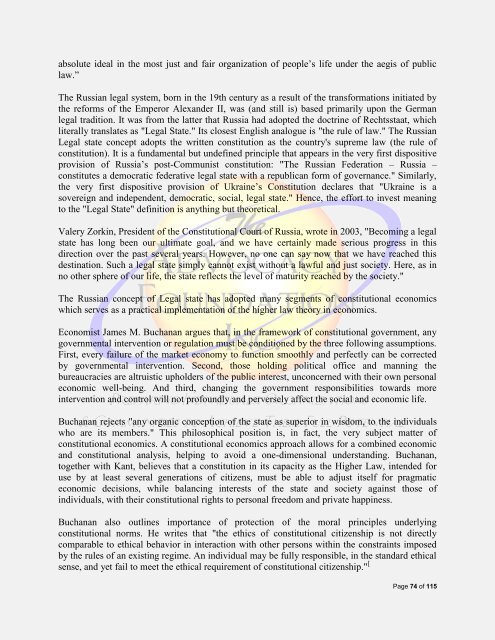Judicial ReEngineering
Judicial ReEngineering
Judicial ReEngineering
Create successful ePaper yourself
Turn your PDF publications into a flip-book with our unique Google optimized e-Paper software.
absolute ideal in the most just and fair organization of people’s life under the aegis of public<br />
law.‖<br />
The Russian legal system, born in the 19th century as a result of the transformations initiated by<br />
the reforms of the Emperor Alexander II, was (and still is) based primarily upon the German<br />
legal tradition. It was from the latter that Russia had adopted the doctrine of Rechtsstaat, which<br />
literally translates as "Legal State." Its closest English analogue is "the rule of law." The Russian<br />
Legal state concept adopts the written constitution as the country's supreme law (the rule of<br />
constitution). It is a fundamental but undefined principle that appears in the very first dispositive<br />
provision of Russia’s post-Communist constitution: "The Russian Federation – Russia –<br />
constitutes a democratic federative legal state with a republican form of governance." Similarly,<br />
the very first dispositive provision of Ukraine’s Constitution declares that "Ukraine is a<br />
sovereign and independent, democratic, social, legal state." Hence, the effort to invest meaning<br />
to the "Legal State" definition is anything but theoretical.<br />
Valery Zorkin, President of the Constitutional Court of Russia, wrote in 2003, "Becoming a legal<br />
state has long been our ultimate goal, and we have certainly made serious progress in this<br />
direction over the past several years. However, no one can say now that we have reached this<br />
destination. Such a legal state simply cannot exist without a lawful and just society. Here, as in<br />
no other sphere of our life, the state reflects the level of maturity reached by the society."<br />
The Russian concept of Legal state has adopted many segments of constitutional economics<br />
which serves as a practical implementation of the higher law theory in economics.<br />
Economist James M. Buchanan argues that, in the framework of constitutional government, any<br />
governmental intervention or regulation must be conditioned by the three following assumptions.<br />
First, every failure of the market economy to function smoothly and perfectly can be corrected<br />
by governmental intervention. Second, those holding political office and manning the<br />
bureaucracies are altruistic upholders of the public interest, unconcerned with their own personal<br />
economic well-being. And third, changing the government responsibilities towards more<br />
intervention and control will not profoundly and perversely affect the social and economic life.<br />
Buchanan rejects "any organic conception of the state as superior in wisdom, to the individuals<br />
who are its members." This philosophical position is, in fact, the very subject matter of<br />
constitutional economics. A constitutional economics approach allows for a combined economic<br />
and constitutional analysis, helping to avoid a one-dimensional understanding. Buchanan,<br />
together with Kant, believes that a constitution in its capacity as the Higher Law, intended for<br />
use by at least several generations of citizens, must be able to adjust itself for pragmatic<br />
economic decisions, while balancing interests of the state and society against those of<br />
individuals, with their constitutional rights to personal freedom and private happiness.<br />
Buchanan also outlines importance of protection of the moral principles underlying<br />
constitutional norms. He writes that "the ethics of constitutional citizenship is not directly<br />
comparable to ethical behavior in interaction with other persons within the constraints imposed<br />
by the rules of an existing regime. An individual may be fully responsible, in the standard ethical<br />
sense, and yet fail to meet the ethical requirement of constitutional citizenship." [<br />
Page 74 of 115

















